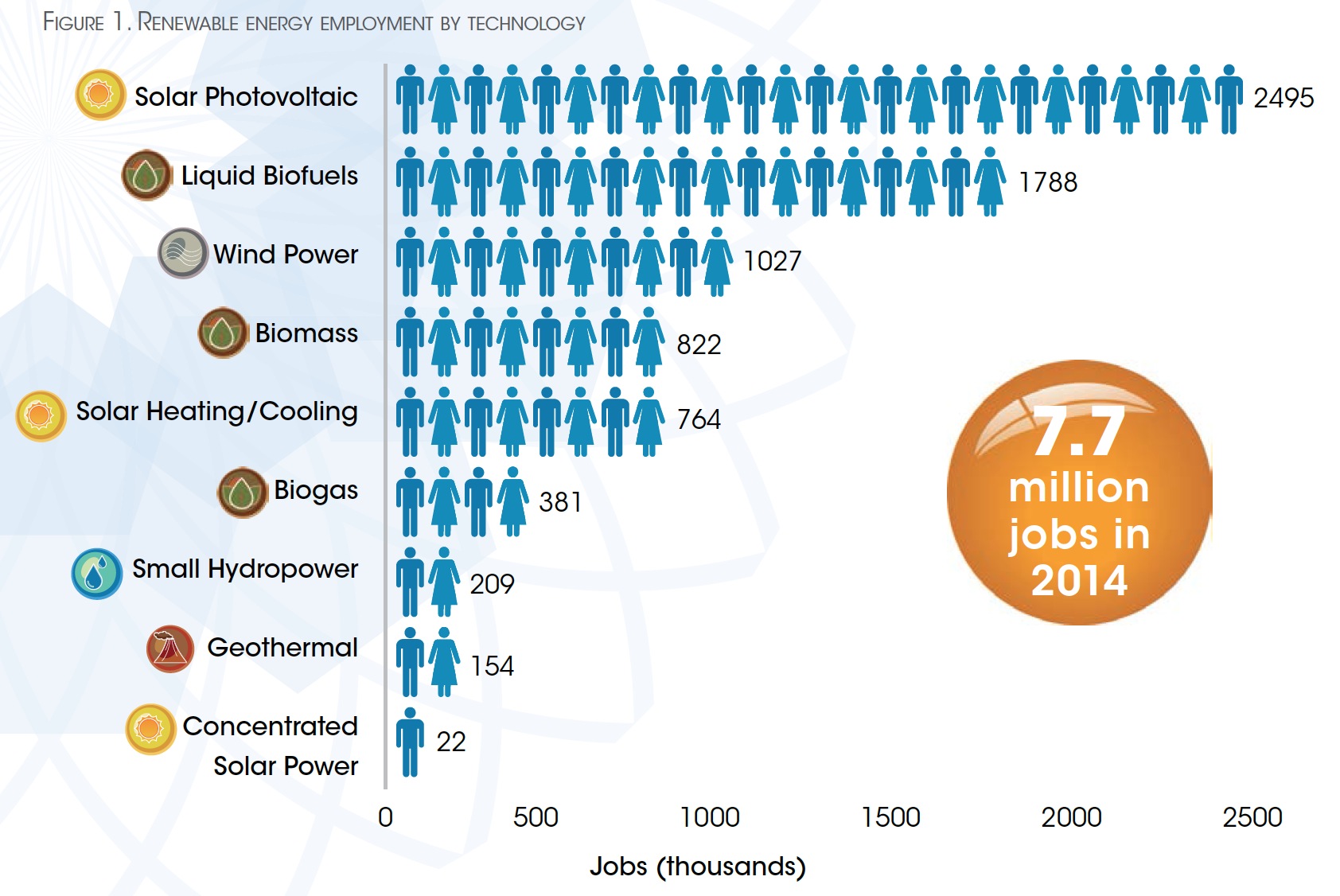INTERNATIONAL RENEWABLE ENERGY AGENCY (IRENA)
Key Facts
- Renewable energy jobs reached an estimated 7.7 million in 2014, excluding large hydropower.
- Jobs in the sector increased 18% from the estimate reported last year and the regional shifts towards Asia continued, especially in manufacturing.
- The 10 countries with the largest renewable energy employment were China, Brazil, the United States, India, Germany, Indonesia, Japan,
- France, Bangladesh and Colombia. In 2014, the solar PV sector accounted for 2.5 million jobs, of which two-thirds were in China. Solar PV jobs also grew in Japan, while decreasing in the European Union.
- Biofuels (1.8 million), biomass (822,000) and biogas (381,000) are also major employers, with jobs concentrated in the feedstock supply. While Brazil and the United States continued to dominate, Southeast Asia saw growth in biofuel jobs, reflecting measures to support production.
- Wind employment crossed the 1 million mark, with China accounting for half of these jobs. The United States, Brazil and the European Union also saw gains.
- Solar water heating and cooling employed 764,000 people, more than three quarters of them in China. Other significant markets are India, Brazil and the European Union.
- Small hydropower employed about 209,000 people, more than half in China, followed by the European Union, Brazil and India.
- Large hydropower was estimated to support another 1.5 million direct jobs, mostly in China and largely in construction and installation.
- An array of industrial and trade policies continues to shape employment, with stable and predictable policies favouring job creation.
IRENA estimates that renewable energy employed 7.7 million people, directly or indirectly, around the world in 2014(excluding large hydropower). This is an 18% increase from the number reported last year. In addition, IRENA conducted the first-ever global estimate of large hydropower employment, showing approximately 1.5 million direct jobs in the sector.
This second edition of the Renewable Energy and Jobs – Annual Review presents the status of renewable energy employment, both by technology (Figure 1) and in selected countries (Figure 4). The table at the end of this report summarises the findings across major markets.
Like last year, falling prices for solar photovoltaic (PV) and wind equipment globally posed a challenge for manufacturers in some markets, thus affecting jobs. Yet, accelerated solar PV installation and expanded operations and maintenance spurred job growth.
Manufacturing of solar PV panels moved decisively from Europe and North America to Asia, where shifts continue between countries. On the installation side, China and Japan were major markets. Wind power jobs have increased steadily following a market revival in 2014 led by China, Germany and the United States (GWEC, 2015; Navigant, 2015). Employment in biofuels continued growing in the United States and Brazil, and in emerging labour-intensive Asian markets where biofuel production witnessed accelerated expansion.
The world’s leading countries for renewable energy employment remain the same as in previous years: China, Brazil, the United States, India, and some members of the European Union, notably Germany. In addition, new markets have emerged including Indonesia, Japan and Bangladesh. In Latin America, Brazil remains the dominant player, followed by Colombia, Argentina and Mexico. Renewable energy-related employment remains low in Africa except in a few countries, like Kenya, Morocco and South Africa, where deployment growth is creating domestic value and jobs. Globally, renewable energy employment continues to be shaped by an array of supportive industrial and trade policies.
Download full version (PDF): Renewable Energy and Jobs – Annual Review 2015
About the International Renewable Energy Agency (IRENA)
www.irena.org
The International Renewable Energy Agency (IRENA) is an intergovernmental organisation that supports countries in their transition to a sustainable energy future, and serves as the principal platform for international cooperation, a centre of excellence, and a repository of policy, technology, resource and financial knowledge on renewable energy. IRENA promotes the widespread adoption and sustainable use of all forms of renewable energy, including bioenergy, geothermal, hydropower, ocean, solar and wind energy in the pursuit of sustainable development, energy access, energy security and low-carbon economic growth and prosperity.







 RSS Feed
RSS Feed